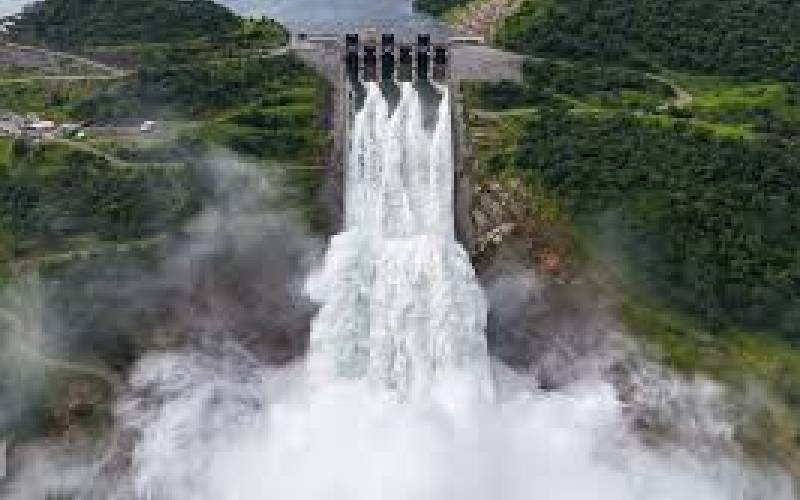Attention has quickly turned to Ethiopia – Africa’s second-most populous nation – following the inauguration of a $5 billion dam on the Blue Nile River.
The launch of the Grand Ethiopian Renaissance Dam (GERD) on Tuesday came with unrivaled fanfare. Judging by the guest list, regional kingpins are happy. But not all Ethiopians are thrilled.
Egypt and Sudan, citing the historical Nile Water Treaties, have voiced strong opposition. For them, GERD is a diplomatic provocation. They’re calling it a slap in the face and bluntly, a shrug at centuries of shared water rights. Diplomatic rifts can be messy and ugly. For Addis Ababa, however, the dam signals a new era of economic transformation in a country whose 69 million citizens are off the grid. It opens doors of hope for growth in irrigation, energy exports and tourism. With a GDP of $163.7 billion mainly driven by agriculture, Ethiopia views GERD as a door to its future. But as we marvel at this mega hydro-electric project in the Benishangul-Gumuz region, we must not to let bright lights of progress blind us from darker realities of life like the Tigray conflict and its grim effects.
In 2022, soft-spoken World Health Organisation (WHO) Director-General Tedros Adhanom Ghebreyesus reprimanded global leaders for ignoring the brutal war between Ethiopia’s federal government and the Tigray People’s Liberation Front (TPLF).
Follow The Standard
channel
on WhatsApp
In an uncharacteristic outburst, the WHO chief called it ‘the worst humanitarian disaster on Earth’ and questioned whether the muted global response was due to the skin colour of the victims. Why, he asked, is there urgency when atrocities occur in Europe, but silence when they happen in Africa?
He was right to speak out. I am a widely travelled proponent of an open-minded world who appreciates the power and otherwise of skin colour. No conflict of the Tigray scale should be neglected, and racial or religious indifference must never be allowed to justify international inaction. Since 2020, Tigray has witnessed atrocities on a mass scale. Human rights organisations of global repute such as Amnesty International and Human Rights Watch have documented massacres, extrajudicial killings, mass rapes, arbitrary detentions and forced starvation by multiple parties.
Conservative estimates suggest that more than 500,000 people have died from violence, hunger and lack of medical care. More than 2.8 million were displaced and more than five million needed humanitarian aid. Studies show mortality rates among adults and the elderly more than doubled during the war. Meanwhile, some 10,000 survivors of conflict-related sexual abuse have shared their stories. Observers fear that even after the 2022 Pretoria Agreement that ended large-scale fighting, Tigray remains devastated and largely forgotten. The silence is deafening and dangerous. Civil rights icon Martin Luther King Jr once said that ‘the ultimate tragedy is not the oppression and cruelty by the bad people but the silence by the good people’.
As we celebrate the dam, we must remember that another slide into conflict would be deadly. The Ethiopian government must now show the same political will and resource commitment it did for GERD to fully implement the Tigray peace deal. This includes fully disarming combatants, restoring local administration and resuming critical services like healthcare, electricity and water. It’s the right thing to do.
Safe humanitarian access, civilian protection and justice for victims of war crimes are non-negotiable. The world may move on but history never forgets. Only bold, principled action can unshackle Ethiopia from the chains of its dark past. There’s the risk of using glitters of the dam to sweep Tigray horrors under the rug.
Prime Minister Abiy Ahmed, our massaging neighbour, requires full global support. His administration must commit to unifying Ethiopia. The African Union and United Nations too have their work well cut out. They must not repeat their inaction witnessed in Rwanda, Syria, South Sudan or the Central African Republic where silence fuelled genocide and mass suffering. It might take long to redeem Tigray. Stakes are high and TPLF has split into bitter factions. Nonetheless, Ethiopia and its allies have an obligation to ensure justice to all war victims is served.
The writer is a communications practitioner. X:@markoloo
Follow The Standard
channel
on WhatsApp
By Mark Oloo
